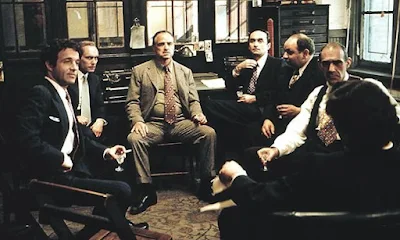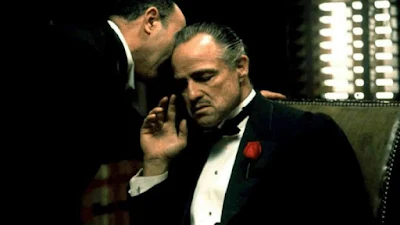Machiavelli's teachings in The Godfather
Comparison between the book by Nicholas Machiavelli and the work of Mario Puzo .
The Godfather, in its literary and film meaning, reproduces the strategies and tactics of The Prince, by Machiavelli.
The appearance of the book The Prince by Nicholas Machiavelli is the starting point of politics as a science.
A science that after hundreds of years has found its philosophy, methodology and conceptual frameworks for the study and treatment of transcendental phenomena for modern societies: Power-Domination-State relations.
The integral determination of politics is not going to go through the purely scientific path, but also tends to become an art and technique for obtaining, operating, preserving and increasing Power, be it for individuals or well-structured groups.
In its applied part, politics is converted into a set of techniques to enhance strengths and thus access the sphere of domination and control. The fascination caused by the term Power involves the psyche and activities of the vast majority of people, especially when the ideology of the hegemonic life system places individualism and competitiveness above humanist principles and values.
 |
| Machiavelli's teachings in The Godfather |
When Power is achieved, in any of the areas of life, the "intangibility" of its definition becomes something concrete in the forms of behavior (social, cultural, political and economic). Power is such a seductive word that it is explicit both in Machiavelli's political work and in Mario Puzo's novel and its masterful representation in Francis Ford Coppola's film.
The Godfather, in its literary and film meaning, reproduces the strategies and tactics of The Prince, by Machiavelli. The dialogues and scenes and acts shown by the Corleone family have convergent angles with the writing of the 16th century, since:
Use cruelty only once
For Vito Corleone to position himself in Power, he had to take over the political, social and economic controls of the Italian neighborhood of New York, through the murder of Don Fanucci, who had the illegal activities of said environment with a very personal style of activating terror among the neighbors.
Paraphrasing Machiavelli, the Sicilian immigrant had to usurp a space of Power by committing all the acts of cruelty that he considered convenient for his purposes -in a single exhibition-, in order not to waste greater efforts and resources by having to repeat over and over again a controlling action. This is how Don Corleone did it: he used cruelty on a single occasion, but in a forceful and spectacular way. This managed to strengthen his Power and live safe, because he had managed to instill fear and respect.
Trust only in your own strength
When conquering a new "principality" the most recommended way by Machiavelli is the use of one's own forces and weapons, leaving the use of mercenary groups as the last option. By assassinating the old capo Fanucci, he positioned himself as the new boss without dispute from anyone. If he had ordered his fellow gang members to kill this figure, he would most likely have sparked a succession revolt, resulting in more deaths and losses.
Maintain and increase power
After this episode, Don Corleone did not have much difficulty establishing himself as the character of Central Power, since the won "territory" was eager for change, having been subjected to procedures of terror and coercion that were already unbearable. As the new "Prince" Don Corleone used new tactics to maintain and increase his Power (that did not come from extortion or collection of protection fees), through a system of "favors" and payment of sums of money to allies, partners minors and government officials.
The applied violence was selective, by virtue of the fact that the cruelty referred to in the Machiavellian teachings was only going to be dealt with when it was really necessary, that is, as a last resort. Violence was not an end, but a means to achieve Power, wealth and status.
A man of word
Not everything that The Godfather does coincides with the teachings of Machiavelli, especially with regard to unconditional respect for the pledged word. The 16th century Florentine stipulated that if all men were upright, the principle of deceit would not be necessary to break the promises made.
Don Corleone defended the word offered as an immovable value, seen as a gentleman's agreement. This brought him respect, submission, and profit.
Unlike Machiavelli who established that men are wicked and liars, so no promise could be sustained for a long time. However, for the setting of the plot of The Godfather this characteristic was advantageous to him, by virtue of achieving the ends that were required in an early and middle stage of his "criminal empire".
Machiavelli's maxim seems to recover its real dimension when at the end of his mandate, Don Corleone no longer had the respect, strength and confidence of the rival clans. The generational replacement of Michael -his son of his- came to give forcefulness to the Machiavellian principle that we are referring to, since one of the first actions he carried out was "to hit the traitors and anyone who got in the way hard and with everything " . At the same time, he took advantage of a personal tactic of dissimulation, which gave him the virtue of hiding intentions in decision-making and actions to be carried out.
Have a good team
In the consolidation phase, Don Vito Corleone adopted the strategy of surrounding himself with a loyal human team and using his own resources, which is attached to Machiavelli's recommendation when he wrote that autonomy in the use of force is always better.
Transfer of power
Don Corleone's family is similar to hereditary principalities, since Mafia tradition from Sicily stipulates that the transfer of command was given to the eldest son (the rescue of Roman patriarchal structures). In this sense, the accumulation of political virtues of the natural successor is not -in most cases- as developed as others that have to be fully used to conquer a domain.
For the eldest son of The Godfather, Sony, it did not mean much effort to take Don's place, since he only limited himself to obeying the boss's orders and in the end he would inherit control. He limited himself to cultivating the use and abuse of force, as well as the transmission of direct messages of attack against everything that was contrary to his father's mandate.
In the case of Michael Corleone (the youngest son), who was not even contemplated to hold a position within the family organization, he had to deal with the anger, disobedience and problems generated by the death of The Godfather, especially because this It occurred at a time when the American mafia was rebuilding itself as well as the capitalist system worldwide.
Don't let there be chaos to avoid a war
With the death of Vito Corleone, ownership fell to Michael, as the older brother was gunned down in an ambush by rival New York families. The next in line to the "throne" was Fredo, who was the middle brother and a shy character without character to take the reins of the family business, which was beginning to establish itself as a diversified economic empire.
The new Godfather continued with the application of Machiavellian teachings, such as: never let there be chaos to avoid war in the face of the inevitability of the circumstance, since in the end this kind of pause does not stop the conflagration, it only postpones it. In the case of his older brother, his irate and irrational temperament led to the unleashing of vendettas between the mafia clans, the union to seize Corleone power and, in the end, his own death. Michael was not going to allow himself the luxury of going down this route. He was going to be simply and simply impeccable and relentless in all of his acts.
Feared and cruel, rather than merciful and loved
Michael Corleone as the new "sovereign" launched a strategy to be truly feared for his decisions. In this regard, Machiavelli's slogan "It is better to be feared and cruel than merciful and loved" was adjusted one hundred percent, since the new Don always sought radical measures in the face of conflicts that could end in imbalance, loss of Power and finance.
It seems that I am portraying an authoritarian despot, but that is not the case. The use of cruelty is not motivated by angry outbursts, but is completely deliberate and purposeful actions. Michael Corleone never proved to be impulsive like his older brother, Sony, but he was calculating, blunt and cruel when he was needed.
He moves away from Don Vito when he sets his position against traitors: there is no forgiveness against them. The collection of treason or threat to the Power of the family was not visceral or a product of the situation, but was planned down to the finest details and executed with all available resources of violence, to set an example for rivals.
Loyal advisors
Michael Corleone also applied the teaching of Nicholas Machiavelli to have loyal and efficient people by his side, who did not feel empowered enough to later fight for Power. He concentrated the decisions, asking for advice from a small group of people worthy of his trust. Among them his foster brother Tom Hagen, whom he listened to for being the family counselor, but never introduced him to the development of Power actions.
The role of adviser was very appreciated by Michael Corleone, since he was a kind of alter ego, who had no strength on his own or the possibility of disputing even a portion of Power. In this vein, the new Godfather knew how to divide the work of his subordinates, to such an extent that some were advisers, specialists in some branch of the business and other collectors, assassins or liaisons.
Conclusion
In the inflexible logic that determines points of intersection between one or more objects to be analyzed by some science or social discipline, the mixture between The Prince and The Godfather seems to have neither head nor tail. However, the two works deal with a common denominator: Power and for this very reason they are worth comparing. Strategies, tactics, advice in the form of cinematographic or literary dialogue can be used not only in the political field, but also in other and very diverse activities of social and productive life, and in this specific case, illegal practices.
Many, many people have or try to have their preserve of Power and that is why the Power theme of both works becomes attractive. Envisioning, obtaining, developing, maintaining and increasing Power is an intrinsic part of social relationships (home, school, friends, work, political parties, State institutions, etc.) and for this reason, entering even on the periphery of this phenomenon produces curiosity. , greed and worry.
My intention was to compare similar actions and not dictate evaluative criteria. I end this work stating that the desire for Power is stronger than any other human feeling (love, justice, balance, peace and happiness), since there is a belief that having it "others are good in addition".








Comments
Post a Comment